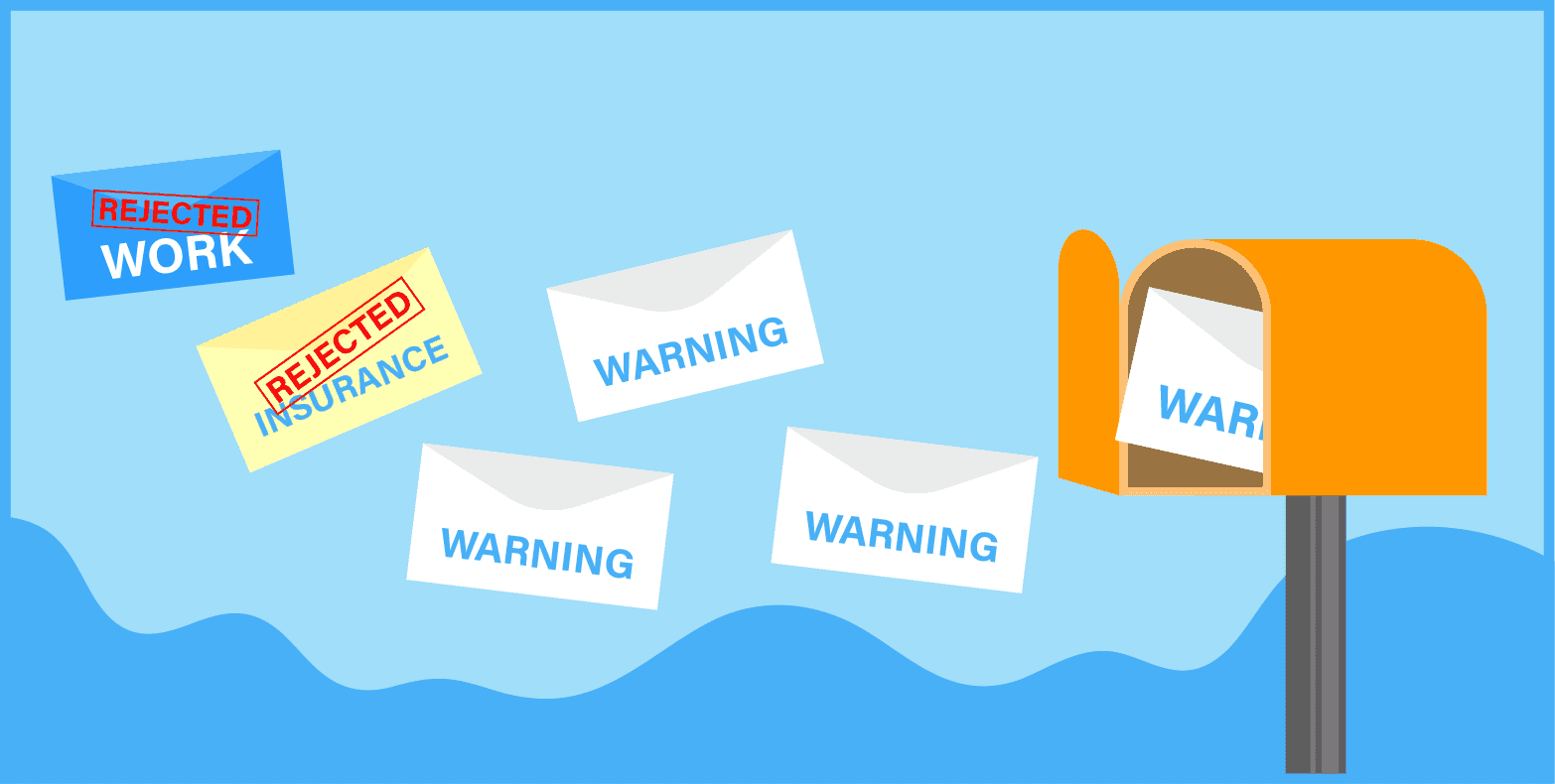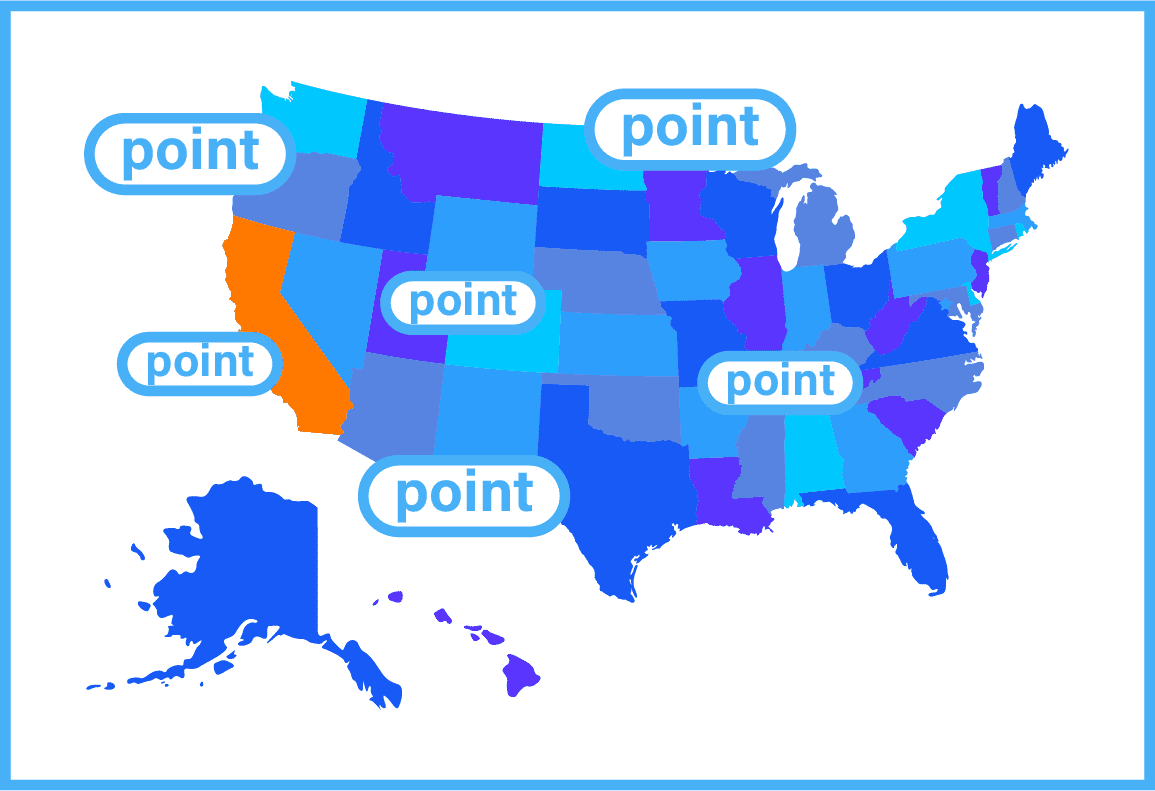In California, the majority of single-point offenses will remain on your record for 36 months or longer. More serious offenses, such as hit-and-runs, reckless driving, or DUIs, stay on your license for up to 10 years.
Here’s we’ll take a look at how long the points from various violations will stay on your license, and what you can do about it.
Points for Common Traffic Violations
The California DMV uses a point system to monitor your driving behavior. Accumulating too many points within a specific period can result in license suspension. It may also require you to take additional steps when renewing your California driver’s license.
Any moving violations or criminal traffic offenses will add one or two points to your California driving record. Here are some examples.
| 1-POINT Violations | Duration on Record | 2-POINT Violations | Duration on Record |
| Disobeying a traffic officer | 3 years | Driving with a suspended or revoked license | 7 years |
| Failure to yield the right of way | 3 years | Driving on the wrong side of the road | 10 Years |
| Illegal passing | 3 years | Speeding over 100 mph | 7 years |
| Following too closely | 3 years | Hit-and-run collisions | 10 Years |
| Driving on a bike lane | 3 years | DUI offenses (such as drinking and driving) | 10 Years |
| Driving too slowly | 3 years | Reckless driving | 10 Years |
| Driving on the sidewalk | 3 years | Engaging in speed contests | 10 Years |
| Red light camera tickets | 3 years | Evading a peace officer | 10 Years |
| Cell phone use while driving | 3 years | Transporting hazardous materials without a permit | 10 Years |
| Disobeying traffic signals | 3 years | ||
| Crossing a solid white line | 3 years | ||
| Crossing a divided highway | 3 years | ||
| Improper lane use | 3 years | ||
| Speeding in a construction zone | 3 years | ||
| Speeding on a bridge or through a tunnel | 3 years |
Not all traffic violations carry penalty points. For instance, you may get fined for parking in a restricted area, but the ticket won’t affect your driving record. These and other “non-moving violations” like expired vehicle registration and failure to display license plates properly are considered zero-point violations.
Read: How Does the DMV Point System Work in California?
Consequences for Getting Points on Your License

If you’ve accumulated some points on your license, you’re probably wondering what that means for you. Here are some of the things that can happen in California.
You Can Lose Your License
California uses a system called the Negligent Operator Treatment System (NOTS), which applies to all drivers in the state who are 18 and older. Under NOTS rules, your license can be suspended or revoked if:
- You receive four points within 12 months
- You receive six points within 24 months
- You receive eight points within 36 months
If you breach these thresholds, the DMV will consider you a negligent operator. Each time you’re found guilty of committing a traffic violation and get points on your record, you’ll receive a letter from the DMV.
As you get more and more points, you’ll receive letters of warning. If you accumulate enough points to have your license suspended, the DMV will send you an official Order of Suspension.
You’ll Have to Pay Fines and Fees
Traffic violations that result in points also come with fines. The more points you accumulate, the more likely you are to incur additional penalties and fees. There are also late fees if fines are not paid on time.
You May Have to Go to Court
For more serious or repeated offenses, you may be required to appear in court. Failure to appear can lead to additional penalties, including a bench warrant. This can lead to an arrest and immediate court appearance.
Your Insurance Premiums May Rise
In California, if you’re found at fault in an accident, your car insurance rates will go up by around 35%. More severe offenses have a steeper impact. For example, racing or reckless driving can lead to a 66% increase in your insurance premiums.
However, each insurance provider has its own way of assessing points, so the impact on your premiums may vary
It Can Impact Your Employment
The points on your license can also make it harder to find work. Some jobs require a clean driving record, so having points on your record can hurt your chances of employment.
What’s more, if your current job requires a clean driving record, you could get fired for receiving demerit points.
You May Be Classified as a Habitual Traffic Offender
If you accumulate enough points through serious violations (like DUIs), the DMV may classify you as a habitual traffic offender (HTO). This means you’ll face stricter penalties and longer license suspensions. You may also receive jail time and fines of up to $1,000.
Traffic school can help you keep a clean driving record, prevent insurance increases, and more!
Can You Get Points on Your California Driving Record for Violations in Other States?

Each state uses a different point system to rate drivers. But when you receive a traffic violation in another state, the state can report it to California. California then evaluates the out-of-state violation. If it’s considered a point-worthy offense in California, points are added to your driving record.
There are some instances where a violation in another state is less likely to result in points on your license in California.
Most states belong to a system called the Driver License Compact (DLC). This means that member states openly share records of tickets and violations with one another.
The only states that do not belong to the DLC are Georgia, Massachusetts, Michigan, Tennessee, and Wisconsin. That means that receiving a ticket or being found guilty of a violation in any of those five states is less likely to result in points on your California driving recrod.
Keep in mind that this is not a guarantee. Massachusetts, for instance, isn’t a member of the DLC but still shares information with other states through the Registry of Motor Vehicles.
There are also states that don’t assess points to drivers for minor violations, like speeding tickets where you’re found to be going less than 15 mph over the speed limit. These include Colorado, Maryland, Nevada, New York, and Pennsylvania.
However, a minor traffic violation in one of these states could still result in points on your California driver’s license if the offense is reported to California.
How to Erase Points in California

Completing traffic school in California typically means you can mask one point from your driving record.
The point will not be visible to insurance companies, which can help keep your insurance premiums low. It will also be hidden from employers, improving your odds of getting or keeping a job that requires a clean driving record.
In California, you’re eligible to attend traffic school for most one-point violations. You may also be able to take the course following a more serious offense, but that’s at the discretion of the judge overseeing your case.
Just make sure you choose a DMV-approved traffic school. Otherwise, you won’t receive credit for completing the course, so the point will remain on your driving record.
We’re a California DMV-licensed online traffic school, and our course is accepted by all courts in the state. We’re also one of the only traffic schools in California to provide the course in English and Spanish with free audio narration.
Why Choose Best Online Traffic School
If you got a ticket and don’t want those points on your license, Best Online Traffic School is easy (99% of our students pass the course on their first try), affordable, and loaded with perks that other traffic schools can’t match.
These include:
✅ Study at your own pace from any device.
✅ 24/7 live chat support.
✅ Audio read-along in English, Spanish, and Chinese.
✅ Free, unlimited course retakes.
✅ Free instant electronic certificate.
✅ Pay only after you pass the final test
✅ Same-day submission to the court and DMV
Wondering how much traffic school costs? We charge an all-inclusive flat fee of only $27.99. This rate covers your study materials, course retakes, and everything else — and you only pay after you pass.
Don’t let a ticket skyrocket your insurance rates. Start traffic school for FREE today.
FAQs About How Long Points Stay on Your License in California
Still need more information? Here are the answers to some frequently asked questions.
How many points can I get in California?
You can get one or two points, depending on the type and severity of the offense. For example, running a stop sign can add one point to your record, whereas driving with a suspended license will result in a two-point penalty.
How to check points on a license in California?
The only way to see how many points you have is to check your driving record. You can request a copy online, by mail, or in person.
How long does a suspended license stay on your record in California?
The answer depends on the type and severity of the offense(s) that resulted in license suspension.
If your points are related to minor offenses, they should fall off your record after three years. But if you get your license suspended for a DUI or other serious offenses, the points will stay on your record for up to 10 years.
How many points for an at-fault accident in California?
If you’re at fault for an accident in California, you’ll receive one or two penalty points, depending on the violation that caused the event.
How many points can I have in a year in California?
California drivers can accumulate up to four points within one year. Once you have reached this number, the DMV will suspend your license.
How many points for a DUI in California?
In California, DUI offenses carry two demerit points, plus additional penalties.
If you’re charged with a DUI for the first time, your driver’s license will be suspended for one year. A second DUI offense will result in a two-year license revocation, while a third offense will lead to a three-year license revocation.
When do points fall off your license?
Demerit points fall off your license within three to 10 years, depending on the nature of the violation. The more serious the offense, the longer the points will stay on your record.
Does Going to Traffic School Erase a Ticket?
Unfortunately, in California, the answer is no. Your ticket will remain on your record and can be accessed by the DMV.
The biggest benefit to traffic school is that it will hide one point from your public driving record, meaning it won’t be visible to car insurance providers and employers.
